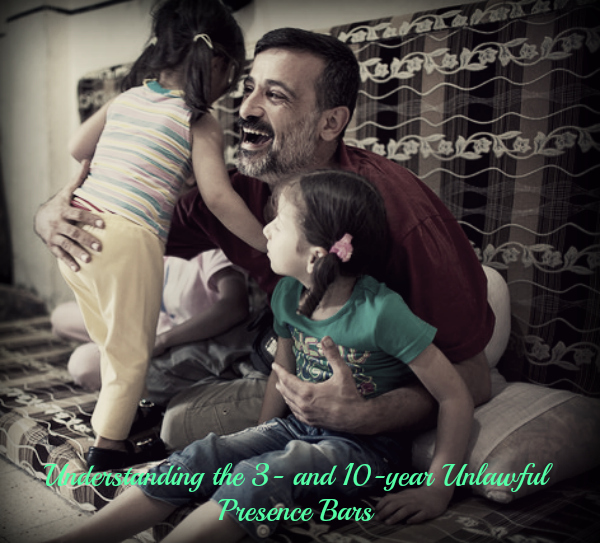For persons who have entered the United States illegally or who have accrued unlawful presence after having overstayed their visa, the possibility of obtaining lawful permanent residence (a green card) is very limited. In the United States there are generally two ways to adjust status to permanent residence. With few exceptions, a green card may generally be obtained through employment-based sponsorship, or family sponsorship based on a qualifying family relationship, such as a U.S. Citizen or Legal Permanent Resident relative. Unlawful presence is a very serious immigration offense that is subject to punishment depending on the amount of time a person has accrued unlawful presence in the United States.
Undocumented immigrants who accrue unlawful presence in the United States, and subsequently leave the country, and attempt to re-enter the United States lawfully, may be subject to either a 3- or 10-year bar, based on the amount of time they have accrued unlawful presence in the United States. Specifically, under the Immigration and Nationality Action Section §212(a)(9)(B)(i)(I) a person who has accrued more than 180 days of unlawful presence in the United States, is subject to a 3-year bar automatically triggered once the person departs the United States. The bar would thereby prevent a person from being re-admitted into the United States, depending on the amount of time they were previously unlawfully present in the country. Similarly, under the Immigration and Nationality Act §212(a)(9)(B)(i)(II), a person who has accrued one year or more of unlawful presence in the United States, is subject to a 10-year bar preventing a person from being re-admitted to the United States, once they have departed from the United States.
So how exactly can an undocumented person legalize their status based on a qualifying family relationship to a U.S. Citizen or Legal Permanent Resident?
This is where the classic Catch-22 dilemma presents itself. Under current immigration law undocumented immigrants eligible to adjust their status to permanent residence (based a qualifying family relationship) must depart the United States in order to legalize their status. That is because persons who were not inspected, admitted, or paroled by a U.S. Customs Official into the United States, are ineligible to adjust their status to lawful permanent resident inside of the United States. As punishment for their accrual of unlawful presence, the undocumented immigrant must depart the United States to legalize their status, and apply for an immigrant visa at a United States embassy or consulate abroad. Of course, in addition to the requirement of departing the United States, a person who has accrued more than 180 days of unlawful presence in the United States, or a year or more of unlawful presence, would then be subject to an immediate 3- or 10-year bar preventing them from re-entering the United States upon their departure. Undocumented persons thus are confronted with a risky situation. Given the reality of the situation, it is not difficult to understand why most undocumented immigrants who would otherwise be eligible to obtain permanent residence, opt to remain in the United States unlawfully, for fear of running the risk of not being able to return to the United States.
The I-601A provisional waiver
The good news is that there are ways to lift a 3 or 10-year ban. The I-601A waiver is available, but may only be used if the applicant can prove that imposition of the 3- or 10-year bar would cause an “extreme hardship” to their U.S. Citizen or LPR spouse or parent. Only spouses and children of U.S. citizens and parents of adult U.S. citizens are eligible to receive a provisional waiver. The I-601A provisional waiver allows a person subject to a 3- or 10-year ban to gain “provisional” approval of their unlawful presence waiver before having to depart the United States to attend the immigrant visa interview abroad. Approval of this waiver, prevents an undocumented person from running the risk of being “stuck” outside of the United States for an indeterminate amount of time.
Expansion of persons eligible for the waiver
Previously the provisional waiver was limited only to immediate relatives of U.S. Citizens. Effective August 29, 2016 however, USCIS adopted a new rule allowing anyone who is statutorily eligible for an unlawful presence waiver under the INA to apply for a provisional waiver regardless of their immigrant visa classification. That means that any person may be eligible to receive a provisional waiver if they can demonstrate the “extreme hardship” component of the waiver.
Eligibility for the provisional waiver has also expanded to individuals with final orders of removal, deportation, or exclusion. In certain instances, persons subject to a reinstatement of removal, who have not yet received notice of removal, may apply for a provisional waiver.
Disclaimer
Obtaining a provisional waiver does not guarantee the issuance of an immigrant visa and ability to enter the United States lawfully. If at the time of the interview, the applicant is found inadmissible based on other grounds (other than accrual of unlawful presence such as the unlawful return to the U.S. after prior removal) the provisional waiver could be revoked. Applicants must keep in mind that multiple unlawful entries may be subject to multiple bars. USCIS will conduct background and security checks on each applicant to determine whether the applicant is inadmissible based on any other grounds (other than unlawful presence). Applicants who believe they are inadmissible based on any other grounds other than unlawful presence, must first file either the I-212 waiver or I-601 application (whichever applies) to waive any “other” grounds of inadmissibility and receive conditional approval before applying for a provisional waiver of unlawful presence. If you have any inadmissibility or criminal issues other than unlawful presence, you may not be eligible for the I-601A provisional waiver. Applicants must discuss any potential inadmissibility issues before filing a provisional waiver.
To determine whether you qualify for the I-601A waiver or any other waiver of inadmissability please contact our office. For information about the services we offer please click here.
 Visa Lawyer Blog
Visa Lawyer Blog


